#political historian
Text

When Auntie Breya Johnson said "I want the next face of empire not to be a black woman," and Ancestor Zora Neale Hurston mused "All my skinfolk ain't kinfolk," THIS is what they meant. Many of our sisters and self-proclaimed feminists are turning their faces away from the freedom struggle and decolonization efforts of our world to fulfill a false dream of empire built on apartheid and antiblack violence.
#Karine Jean-Pierre#our world#black lives matter#ecosystem of white supremacy#this lovecraft country of ours#politics#ugly feminism#zora neale hurston#breya johnson#padawan historian#Afronaut Griot
407 notes
·
View notes
Text
Been listening to books about the Salem witch trials and it’s so weird to me that there’s this prevailing narrative where people think of Salem as “oh they were deluded primitive folk who believed in witchcraft lol” when there are contemporary documents where prominent people said the accusers and the court (which hadn’t followed standard legal procedures even for that time) were committing crimes so grievous it would forever be a stain on New England
#i really recommend the first season of the documentary podcast ‘unobscured’#it goes into great detail the interpersonal relationships and perfect storm politically economically socially and spiritually#that led to the trials#and features extensive interviews with six of the leading historians on the trials and colonial new england
435 notes
·
View notes
Text
As funny as it can be to joke about the mess™ that is currently twitter, it's super depressing to see so much digital history destroyed because a billionaire is having a temper tantrum.
Decades of news, public reactions to political scandals and first hand accounts are suddenly erased, not to mention all the art that is now completely lost. It's all gone --just because of one man's fragile ego. It's actually really tragic to think about.
#twitter#elon musk#news#politics#history#i feel so bad for future archivists historians anthropologists etc#humanity really#so many vital human records#just deleted in an instance#what a waste#psa back up everything you can whenever you can#birdy chirps
1K notes
·
View notes
Text
this twitter thing is a circus, we can make lots of hellsite jokes, but also we're watching the world's richest man buy a communication platform used among other things by governments, scientists, and organizations to communicate with the public and each other (mostly the latter, governments should not be doing business with each other on twitter) and destroy it because nobody can tell him no, and that should terrify you.
#just in my tiny corner of the world#thinking about how important twitter was for prison book programs to reach supporters#specifically non-incarcerated people who can financially support us#but also#look i'm just a schmuck who works in retail#can i roll up to a science conference and ask to sit in on presentations?#can i email this political historian and ask for their take on news events?#no!#but on twitter someone like me can find them and hear directly from them#that is meaningful#at least to me it is
1K notes
·
View notes
Text
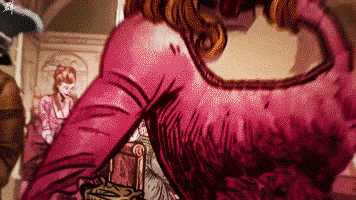
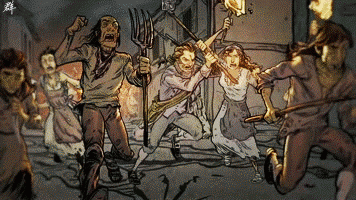
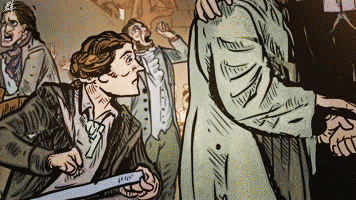
For the average person, all problems date to World War II; for the more informed, to World War I; for the genuine historian, to the French Revolution.
Erik von Kuehnelt-Leddihn
#Erik von Kuehnelt-Leddihn#kuehnelt-leddihn#quote#french revolution#14 july 1789#bastille day#history#french history#world history#civilisation#western history#politics#historian#ideology#revolution#europe
266 notes
·
View notes
Text
This is not an exaggeration.

We are months away from Christofascism if we don't vote. I know people are already frustrated and in pain, but I can't tell you how much worse Republicans will make life for us. I'm begging you to look at the laws they are trying to pass right now.
And I'm begging you to vote. Please check that your voter registration is up to date (some states' deadlines are coming up this month), and make a plan to vote on or before November 8, 2022.
775 notes
·
View notes
Text
“hiSTORy iS WRitteN bY THe vicTORs¡”
Oh do fuck off with that Churchillian, pompous, small-minded, imperialist, triumphalist Great Man Theory bullshit!
That stopped being true after 1945 and you know it!
Get in the bin with that shite!
Besides I’m pretty sure that quote was actually about biased narratives.
Mind you, I’m not using it to justify revisionism or “lost cause” narratives! That shit can also get in the fucking bin! Starting yesterday.
#dougie rambles#personal stuff#vent post#history#great man theory#bullshit#historians#historiography#political crap#more or less#academics#social history#bias#biased#narratives#quotes#kind of#refutation
50 notes
·
View notes
Text
(Edward IV) had two healthy young sons and died peacefully, in the belief that, with his enemies dead or compromised and his family loyalties assured, they would survive to adulthood, securing the future of the House of York. That this proved not to be the case should add a note of pathos to his history which has, in fact, been conspicuously absent.
Andrew Robert Whittle, “The Historical Reputation of Edward IV 1461-1725”
#edward iv#my post#I think that historians who compress or diminish Edward's reign by narrativizing the WotR or viewing it as a grand historical sequence#or viewing the renewing to conflict in 1483 as inevitable when it wasn't and certainly wasn't viewed that way at the time -#really miss the poignance of this and the impact it would have probably had with contemporaries.#It's like Horrox said: 'Even more fundamental was the perception that it had been Richard who after the stability of Edward IV's last years#had triggered the return to political conflict for what could be essentially seen as selfish reasons'#And it's really tragic because Edward IV seems to have really trusted his brother#(Elizabeth Woodville seems to have also trusted her brother-in-law)#Only for his brother to betray and destroy his family
46 notes
·
View notes
Text
"None of these rights has any claim to being deeply rooted in history" sure is a weird way to say "if at any point in history you haven't had civil rights, you shouldn't have them now."
1K notes
·
View notes
Text
Insane history analyst scorpius malfoy writes some of the most compelling nonfiction you will EVER read but if you ask him about it you will go crazy. god does that boy ramble.
#scorpius malfoy#hpcc#sorry this is such a little thing#but im insane about crazed historian scorpius…#his flare of historical analysis is also deeply entrenched with his politics as well#genuinely hes very very well read#so when he hears someone say history is boring or useless or whatever he gets SO#SOOOO overwhelmingly mad but that boy is a people please emotion-bottler so. he just smiles. and disagrees politely
19 notes
·
View notes
Text
The Tudors ran so Wulf Hall could shuffle awkwardly around reiterating the same tired old Tudor stereotypes while claiming to be something new.
#It's so funny but as a historian I will genuinely defend 'The Tudors' to the death even with all its problems#Because it did was so few other Tudor shows/movies/media have ever done#And that is: it focused on things BEYOND just Henry and his wives.#Yes Henry was the focal point which makes SENSE but that's just it:#HENRY was the focal point. Most other Tudor media pieces have one of the wives (usually Catherine/Anne) as the focus and doesn't delve muc#Into the history or what was happening in England beyond the King's Great Matter.#The Tudors went ALL out. Yes they didn't get everything right but the fact that they tried and spotlighted so many other#Historical characters and events? The Pilgrimage of Grace? Actually LOOKING at the religious issues even if they weren't always accurate?#(Like with Aske for example. BUT AT LEAST THEY INCLUDED ROBERT ASKE like good lord it's like other Tudor media forgets everything else)#Focusing on Cromwell but also the Seymour brothers? The politics behind Henry? Even Brandon as annoying as his storylines could get.#Even smaller characters like Tallis and Gardiner and other Reformation and Counter-Reformation figures.#The fact that they featured the Reformation and Counter-Reformation AT ALL let alone tried to dive into the complexities of England's#religious crises. The burning of Anne Askew even? People having to navigate England's increasingly unstable religious situations?#The series hit its peak after the CoA/Anne stuff was over imho. Yes Cranmer and Norfolk annoyingly vanished despite being major figures in#the R/CR and they combined Mary and Margaret but god the Tudors did SO MUCH that NO OTHER PIECE OF TUDORS MEDIA has EVER DONE.#It looked BEYOND Henry BEYOND his wives and tried to paint a comprehensive pictur of a deeply troubling and divisive time in English histor#And it did so without demonising one side and it was just so good for so many reasons that I forgive its errors because damn did they TRY.#Tried in a way no one else ever has (no Wulf Hall did not I'm sorry)#(Wulf Hall was just the same old stereotypes rehashed and branded as something 'original' because it was from Cromwell's POV but again.#Same old stereotypes. Nothing actually original about anything else.)#The Tudors is so underrated for what it tried to do and what it achieved and I am reaching the tag limit but UGH god. Amazing.#Not even getting into how wonderful they were with Mary Tudor/Mary I herself and showing figures around her#Because that would be another tag essay considering the subject of my thesis.#Flawed but wonderful.#text#chey.txt
22 notes
·
View notes
Text
Even in this lovecraft country of ours, we still dance (and decolonize) 🔥🍂🌾✨️
#american apartheid#our world#black lives matter#ecosystem of white supremacy#politics#our history is your history#reproductive rights#environmental justice#padawan historian#late night musings#and music#september#earth wind and fire#childish gambino
228 notes
·
View notes
Text
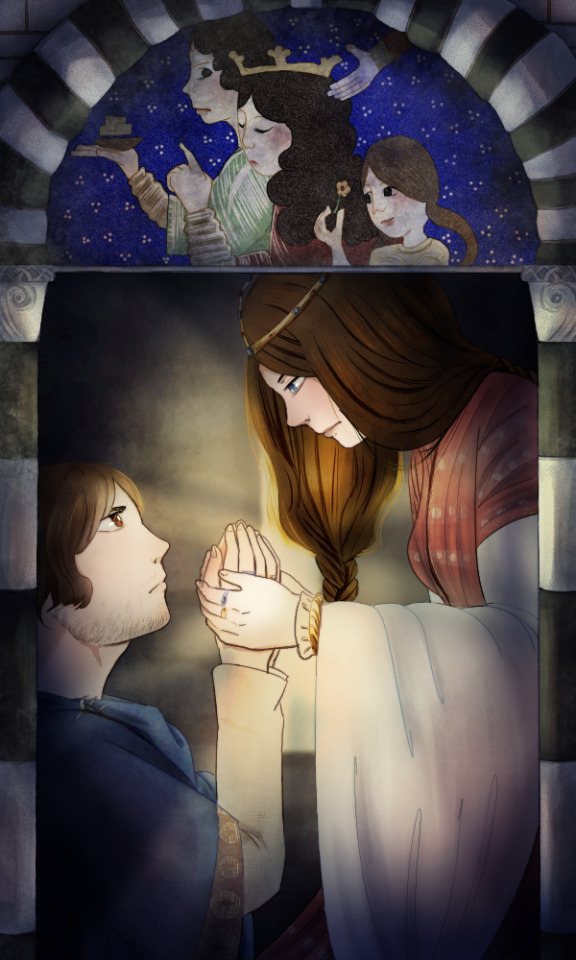
In England, English and Norman barons kill each other to seize the throne and in France, the Carolingian unity having been shattered, the little Capetian king managed his meager possessions under the vigilant and hostile eye of the great feudal lords who watched over over their strongholds and control his every move. Brittany, if it wished, could finally spread its wings. Conan III is careful not to do this and is content to govern peacefully, only too happy that the English and French ropes which hold him by the neck are suddenly so weak. A good duke, good husband, good Breton, he has everything going his way, but was unfortunately a bad father; on his deathbed he disowns Hoël, his son, and chooses as his heir Conan IV, a little boy of 9 years old, the son of his daughter Bertha.
Gilles Martin-Chauffier, Le Roman de la Bretagne
#twelfth century#hoël de cornouaille#bertha de cornouaille#ft konan iii's hand and constance of mayenne i guess 😂#so. I bought the bande dessinée ''Breizh'' bc I'm unfortunately Very Easy and they used this bit from Martin-Chauffier#I agree with historians like Keats-Rohan et al that believe Hoël was somewhat In On It and his spats with Bertha and her husband were#almost always more small-scale (eg how independent Nantes should be relative to the ducal crown etc etc)#but I do sometimes wonder and the BD bit got it rotating again...#given Hoël was iirc the eldest of Konan III's kids and also a dude man in the early 1100's if he was ever tempted by the Cain Instinct...#there's something about Bertha and Hoël largely being allies but also siblings who quarrel on the political stage...#(also an example of the kind of nationalistic writing flourishes I have to wade through every day I'm fighting for my life out here 😭)#(also the idyllic verbiage when Bertha was living in England during said war where the English were killing each other. like...)#shakespeareomnibus
13 notes
·
View notes
Note
How old was Thomas Cromwell when he married Liz Wykes and had Gregory? Did Liz ever know about Norwich?
(with the caveat that I have done some handwavey magic math to make this work and also that I’m still figuring out this part of the backstory).
He was fifteen, she was sixteen and it was very much a whirlwind love and first sight thing going on (I really do know though that if Liz had lived it would have been one of those beautiful loving marriages) - partly they were able to be married because (a) Thomas got befriended by the son of a Florentine Banker (prominent) and (b) Liz’s parents saw he was bright/promising etc and (c) Liz was entirely capable of just Getting Married Regardless (Liz very much was the one to kiss him/equivalent of going ‘is anyone going to put a ring on the hot boy with dark curls?’ and not waiting for an answer.
I think he told her the story, maybe because he got triggered by something. Maybe before they married because he felt he was too tainted to be married and she was like ‘FUCK THAT FUCK HIM I’LL KILL HIM MYSELF’
(In universe historically it’s not known if she knew - mostly because Thomas’ first marriage is kind of not a huge topic of study - pre reveal mostly people focused on his career in England rather than Florence because that’s when the records really start - so they know he was in Florence in the household of [probably a Medici] and they know he was married and had three children but there’s very little else).
(Maya’s work may in fact include having found that Liz Wykes could both read and write - possibly in at least two languages - because there’s a record somewhere of her having signed contracts/replied to a letter and that letter/some of Thomas and Gregory’s papers is where we get a sense of her but they were both very private about their feelings).
#ot3: political power trio#lil and her ridiculous aus#fic#tudors ot3 verse reference#thinking about it like they are the teenage couple who make it#they would have been just as in love in their 90s as they were when they first met#(the ot4 potential though)#there’s a historian somewhere in universe who goes hunting down information in Florence (Liz was in this case born there) and in England
14 notes
·
View notes
Text
Don't you guys love when people tell pages that publish content about history to "leave politics aside" and dedicate themselves to just publish the stuff they follow the page for?
It's because of those same people that children do not like history, because they think that everything is dates and photographs and not the processes of humanity over time. History will never be apolitical.
25 notes
·
View notes
Text
Alright uninformed rant time. It kind of bugs me that, when studying the Middle Ages, specifically in western Europe, it doesn’t seem to be a pre-requisite that you have to take some kind of “Basics of Mediaeval Catholic Doctrine in Everyday Practise” class.
Obviously you can’t cover everything- we don’t necessarily need to understand the ins and outs of obscure theological arguments (just as your average mediaeval churchgoer probably didn’t need to), or the inner workings of the Great Schism(s), nor how apparently simple theological disputes could be influenced by political and social factors, and of course the Official Line From The Vatican has changed over the centuries (which is why I’ve seen even modern Catholics getting mixed up about something that happened eight centuries ago). And naturally there are going to be misconceptions no matter how much you try to clarify things for people, and regional/class/temporal variations on how people’s actual everyday beliefs were influenced by the church’s rules.
But it would help if historians studying the Middle Ages, especially western Christendom, were all given a broadly similar training in a) what the official doctrine was at various points on certain important issues and b) how this might translate to what the average layman believed. Because it feels like you’re supposed to pick that up as you go along and even where there are books on the subject they’re not always entirely reliable either (for example, people citing books about how things worked specifically in England to apply to the whole of Europe) and you can’t ask a book a question if you’re confused about any particular point.
I mean I don’t expect to be spoonfed but somehow I don’t think that I’m supposed to accumulate a half-assed religious education from, say, a 15th century nobleman who was probably more interested in translating chivalric romances and rebelling against the Crown than religion; an angry 16th century Protestant; a 12th century nun from some forgotten valley in the Alps; some footnotes spread out over half a dozen modern political histories of Scotland; and an episode of ‘In Our Time’ from 2009.
But equally if you’re not a specialist in church history or theology, I’m not sure that it’s necessary to probe the murky depths of every minor theological point ever, and once you’ve started where does it end?
Anyway this entirely uninformed rant brought to you by my encounter with a sixteenth century bishop who was supposedly writing a completely orthodox book to re-evangelise his flock and tempt them away from Protestantism, but who described the baptismal rite in a way that sounds decidedly sketchy, if not heretical. And rather than being able to engage with the text properly and get what I needed from it, I was instead left sitting there like:
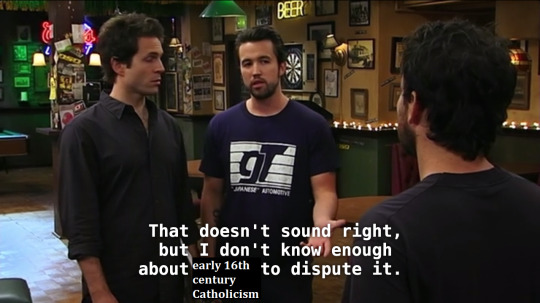
And frankly I didn’t have the time to go down the rabbit hole that would inevitably open up if I tried to find out
#This is a problem which is magnified in Britain I think as we also have to deal with the Hangover from Protestantism#As seen even in some folk who were raised Catholic but still imbibed certain ideas about the Middle Ages from culturally Protestant schools#And it isn't helped when we're hit with all these popular history tv documentaries#If I have to see one more person whose speciality is writing sensational paperbacks about Henry VIII's court#Being asked to explain for the British public What The Pope Thought I shall scream#Which is not even getting into some of England's super special common law get out clauses#Though having recently listened to some stuff in French I'm beginning to think misconceptions are not limited to Great Britain#Anyway I did take some realy interesting classes at uni on things like marriage and religious orders and so on#But it was definitely patchy and I definitely do not have a good handle on how it all basically hung together#As evidenced by the fact that I've probably made a tonne of mistakes in this post#Books aren't entirely helpful though because you can't ask them questions and sometimes the author is just plain wrong#I mean I will take book recommendations but they are not entirely helpful; and we also haven't all read the same stuff#So one person's idea of what the basics of being baptised involved are going to radically differ from another's based on what they read#Which if you are primarily a political historian interested in the Hundred Years' War doesn't seem important eonugh to quibble over#But it would help if everyone was given some kind of similar introductory training and then they could probe further if needed/wanted#So that one historian's elementary mistake about baptism doesn't affect generations of specialists in the Hundred Years' War#Because they have enough basic knowledge to know that they can just discount that tiny irrelevant bit#This is why seminars are important folks you get to ASK QUESTIONS AND FIGURE OUT BITS YOU DON'T UNDERSTAND#And as I say there is a bit of a habit in this country of producing books about say religion in mediaeval England#And then you're expected to work out for yourself which bits you can extrapolate and assume were true outwith England#Or France or Scotland or wherever it may be though the English and the French are particularly bad for assuming#that whatever was true for them was obviously true for everyone else so why should they specify that they're only talking about France#Alright rant over#Beginning to come to the conclusion that nobody knows how Christianity works but would like certain historians to stop pretending they do#Edit: I sort of made up the examples of the historical people who gave me my religious education above#But I'm now enamoured with the idea of who actually did give me my weird ideas about mediaeval Catholicism#Who were my historical godparents so to speak#Do I have an idea of mediaeval religion that was jointly shaped by some professor from the 1970s and a 6th century saint?#Does Cardinal Campeggio know he's responsible for some much later human being's catechism?#Fake examples again but I'm going to be thinking about that today
128 notes
·
View notes